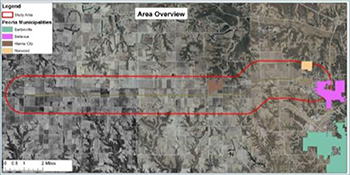Regional Transportation, Ecosystem, and Land-Use Integration Plan

The Big Plan analysis of Illinois Route 336 between Peoria and Macomb. (Courtesy of
TCRPC)
Tri-County Regional Planning Commission (Illinois)
| Total cost: |
$218,954 |
| FHWA share: |
$109,477 |
| Period of performance: |
24 months |
| Dates: |
April 4, 2008 – April 4, 2010 |
| Status: |
Complete |
| AOTR: |
Neel Vanikar/Michael Lamprecht |
| Grant-project website: |
https://tricountyrpc.org/ |
Project Goals
The goal of the Tri-County Regional Planning Commission (TCRPC) Eco-Logical grant project was to complete an integrated planning document known as “The Big Plan,” which focuses on methods to improve the sustainability of the transportation system with respect to ecosystems in the Peoria, Illinois region. The Big Plan includes regional priorities and strategies for land-use and infrastructure development, policy concepts, GIS-based scenario-planning models, and technical implementation.
Project Accomplishments
In September 2010, TCRPC completed the Big Plan, which put forth a regional vision focused on five themes: agricultural preservation, balanced growth, economic development, environmental stewardship, and transportation infrastructure. TCRPC engaged in public education and outreach to encourage local governments to adopt the plan’s findings and worked closely with MPO staff to integrate sustainable transportation strategies into Federally funded projects. TCRPC brought the Eco-Logical principles into its latest long-range transportation plan (LRTP), which provides policy recommendations related to land-use, environment, and public transportation. For example, green infrastructure guidelines from the Big Plan are included in the LRTP. TCRPC also received grant funding from the U.S. Department of Housing and Urban Development (HUD) Sustainable Communities Regional Planning Grant program to integrate planning activities and think more broadly about issues important to the region. The Eco-Logical project provided the framework for TCRPC’s HUD grant proposal.
Future Steps
TCRPC continues to reach out to new partners to expand implementation of the Big Plan. TCRPC has been actively working to achieve the goals and promote target areas from the Big Plan, such as through studying the local foods movement and conducting market analysis to strengthen older neighborhoods. To further the Big Plan’s vision for balanced growth, TCRPC is partnering with a local youth and outreach program to ensure that traditionally under-represented populations are engaged in land-use and transportation planning activities. TCRPC is also working to bring the Eco-Logical principles into the project selection process as part of its Transportation Improvement Program.
Insights on Eco-Logical
TCRPC’s involvement in the Eco-Logical grant program has helped it move forward in establishing a collaborative culture. In the past, TCRPC planning tended to be separated based on jurisdiction or discipline. By thinking more regionally, TCRPC has been able to bring community leaders and transportation and land-use planners together to begin to dissolve these “silos.” TCRPC’s involvement in the Eco-Logical grant program helped to strengthen and encourage its partnerships with local agencies and community groups and involve a broader range of stakeholders in the planning process. TCRPC noted that it is often helpful to have grant programs require local matches, whether in-kind or cash, as this encourages agencies to join together to achieve a common goal.
<< Return to Grant Projects

